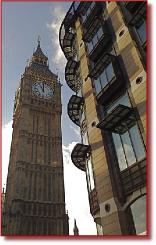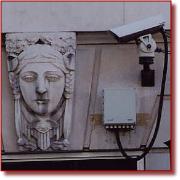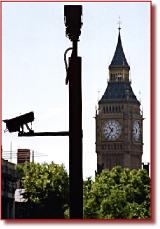A further objective is the adoption of a standardised "Code of Practice" for all publicly operated CCTV systems, something which will fall to the Commissioner to ensure that operators adhere to at all times. The Code is likely to contain guidance on the deployment and operation of public space camera schemes, the determination of technical standards, and specific information relating to the storage, use and suitability of recorded 'CCTV product'. Whilst the intention is to provide an enforcement mechanism to ensure that all aspects of the Code are complied with at all times, in practice any failure to comply will not in itself constitute an offence. Given both analogue "CCTV" and digital "IP Video Systems" will be subject to control under the eventual Act, in respect of emerging video analytic technology, it is only Automatic Number Plate Recognition (ANPR) systems which are specifically referred to in the Bill, and which will be required to be operated in accordance with the'Code'. |
||
I mentioned in passing that the published proposals will be a source of disappointment for some, and that may well be based, not so much on the content of the proposed legislation, but rather the detail omitted. There are very many aspects of everyday CCTV operations that need to be urgently addressed, but unfortunately the proposals do not really at this early stage, appear to go quite far enough. For example, the wider positive media response to government imposing a degree of regulation on publicly operated CCTV schemes, does rather overlook a simple fact. Here in the UK, nobody knows for sure exactly how many security cameras are currently in operation; whilst estimates vary from 4 > 6 million in total, recent research carried out by Big Brother Watch under numerous Freedom of Information requests to CCTV Operators, does suggest that the total number of PSS CCTV cameras actually being operated by local authorities, is almost certainly well below 100,000. Now if for arguments sake we take the 4 million figure as a not unreasonable assumption, albeit that it may well be somewhat on the economical side of accuracy, this would mean that the proposed legislation is really only going to apply to just over 2% of the total number of surveillance cameras currently in use throughout the UK. To put it another way, the 90+% of what are effectively privately owned and operated security cameras, will not be subject to any additional formal regulation, above and beyond that already required under the Data Protection Act, which many people will perhaps be surprised to hear, doesn't actually apply to a significant number of surveillance cameras currently in use. The omission of privately operated CCTV seems all the more incongruous, given that another key objective of the legislation, was the outlawing of hugely unpopular and unregulated vehicle clamping operations, by private contractors on private land. The current proposals do not in themselves provide for any form of inspection or evaluation of either the CCTV technology being used, or indeed the way it's being operated. Indeed the conspicuous lack of any arrangements for end user operator licensing, means that whilst an individual already requires a 'TV licence' to watch their favourite episode of Neighbours, they don't need to be licensed to watch their immediate neighbours on the same telly, using their own residential CCTV camera. It's interesting to note that whilst the 'security use' of local authority operated CCTV cameras is intended to be governed by the proposed "Code of Practice", no such references appear to have been aimed at the significant number of non ANPR cameras already being used for highways monitoring and traffic enforcement. Likewise, emerging technologies such as advanced Video Analytics (VA), Mobile CCTV Vehicles and Body Worn Video (BWV) have not been specifically mentioned, but may well be included at a later date. Whilst a core objective of the CCTV legislation is the development of a model Code of Practice, it will not have gone unnoticed by some that almost without exception, local authority operated CCTV schemes are already subject to a fairly detailed operating code, which has been maintained and complied with voluntarily, for quite some time. The new proposals will certainly help to standardise the content of the various operating codes, but it's unlikely to have any significant impact on the vast majority of schemes already in use. A key plank of the proposals relate to greater accountability, and in future, it's quite likely that individuals may have a much greater say, and indeed opportunity to intervene, in proposals to deploy and operate CCTV cameras in a public place, but undoubtedly, more will become clear as the legislation proceeds through parliament. Whilst the Protection of Freedoms Bill is intended to help address many privacy concerns relating to the use of Closed Circuit Television, it does not in any significant way seek to address the vast majority of everyday issues, that continue to challenge the effective and efficient operation of video surveillance technology, in 21st century Britain. At some point in the future and with the benefit of hindsight, the rather limited scope of the CCTV component in the legislation, may well be viewed by some experts as a golden opportunity lost. Further details:- Protection of Freedoms Bill ( Part 2, Chapter 1) - pages 19 - 24 |
||
![]()
![]()
![]()
![]()
![]()
![]()
![]()
![]()
![]()
![]()
![]()
![]()
![]()
![]()
![]()
![]()
![]()
![]()
![]()
![]()
![]()
![]()
![]()
![]()
![]()
![]()
![]()
IMPORTANT: No material may be reproduced, copied or redistributed from this site, without the express written consent of doktorjon.co.uk
All the detailed information on this site is provided in good faith; and as such, Doktor Jon does not accept responsibility for any consequential loss, injury or disadvantage resulting from any individual or organisation acting on the details contained herein.
© doktorjon.co.uk 2004 - 2011
![]()

![]()
![]()
![]()
![]()
![]()
![]()







